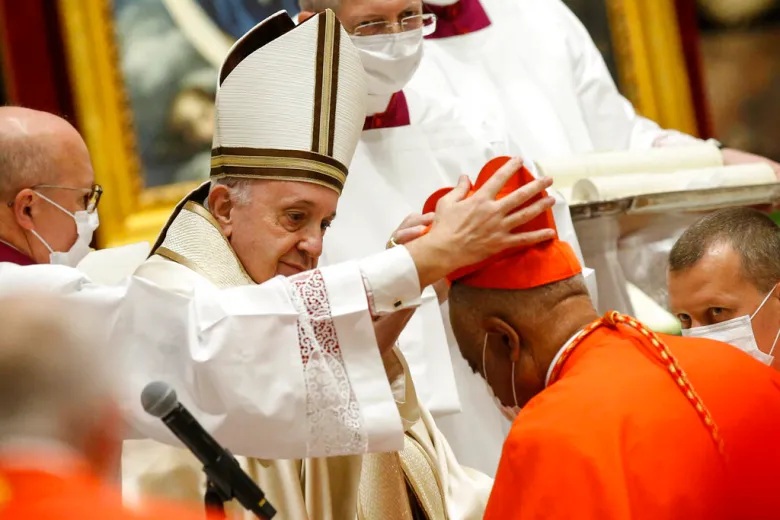by Rev. Dorothy S. Boulware
Word in Black
He installed Washington, D.C.’s first Black cardinal, connected with America’s first Black president, and appointed three Black men who are in contention to succeed him. He condemned racism as a “sin,” visited poor Black communities, and ministered to imprisoned Black men.
As accolades poured in from around the world on the death of Pope Francis, prominent Black Americans pointed to the pontiff’s legacy of advocating for the marginalized, including Black people. Others, however, speculated that Francis redirected church leadership in such a way that the possibility exists for the election of the first Black pope.
In a statement, President Barack Obama said Francis “shook us out of our complacency and reminded us that we are all bound by moral obligations to God and one another.”
The pope was “a great leader and an example of faithful living,” the Right Rev. Paula Clark, bishop of the Episcopal Diocese of Chicago, said in a statement April 21. “He embraced and advocated for all people and was forthright in encouraging peace everywhere.”
Throughout his life and ministry, Francis “has been a witness for the Gospel and a champion for the poor and marginalized,” said the bishop, who is Black. “Especially in this season, I give thanks for his powerful advocacy on behalf of migrants and refugees.”

Shaping the Catholic Church long term
Althea Butler, a professor of religion at the University of Pennsylvania, said Francis’s 12-year tenure as pope was inclusive in a way that has altered the church long-term — and could open the door for a successor from outside of Europe.
Along with his “charismatic” reign and willingness to battle Catholic institutionalists, Butler says Francis “will be remembered for his reshaping of the College of Cardinals in a way that shifted the church’s axis of power outside of Europe.” Indeed, Axios reports that Francis appointed some 80 percent of the cardinals who will choose his successor.
Growing up in Argentina, the son of refugees from the rise of fascism in the 1940s, Francis was the first pope from the Southern hemisphere, circumstances that experts say helped him identify with outsiders and the marginalized.
Not long after ascending to the papacy, Francis — the first pope from the Global South, and the first elected outside of Europe — hosted President Barack Obama at the Vatican in 2014. Although the two disagreed on significant issues like abortion and same-sex marriage, they bonded over social justice issues and struck up a rapport.

The year after Obama’s Vatican visit, Francis came to Washington, allowing Obama to become just the third president to host the leader of the Catholic Church at the White House.
At the same time, Francis quietly began rebuilding church leadership, giving particular attention to Africa in selecting the cardinals who would eventually vote to replace him. Since his death, two of the three Black cardinals considered serious contenders to succeed him are from Africa: Peter Turkson of Ghana and Robert Sarah of Guinea.
The third is Cardinal Wilton Gregory, archbishop emeritus of the Washington archdiocese. Francis appointed him the first African-American cardinal in 2020. Although Gregory is retired, he will still vote during the upcoming conclave to name Francis’ successor.
While the pope gave more attention to Black people than many of his successors, the church as an institution still has work to do when it comes to race, experts say.

Two years ago, the church formally repudiated the colonial-era “doctrine of discovery” — official declarations that justified European conquests of Africa and the Americas. Catholic churches were complicit in — and sometimes benefited from — the African slave trade. The church did not stand unified against slavery during the Civil War, and Jim Crow-era segregation in the pews was common.
Francis, however, issued several declarations and letters to bishops condemning the “sin” of
racism, and spoke out after the murder of George Floyd in 2020. He addressed the issue again in 2023, declaring that instances of racism “continue to shame us, for they show that our supposed social progress is not as real or definitive as we think.” In a visit to Philadelphia in 2015, the pontiff ministered to inmates at Curran-Fromhold Correctional Facility just outside the city.
Bill Henry, Baltimore’s comptroller and a Black Catholic, said that Francis perhaps “didn’t fight all of the good fights that some of us wanted him to, but he certainly fought more than anyone else who has held his job in my lifetime … Requiescat in pace et in amore, papa.”
But for Father Daniel Green, a 39-year-old priest, Francis’s push for the marginalized is arguably the most important part of his legacy.
“Black Catholics have always been hyper-focused on ‘the least of these,’” the priest, who was ordained just weeks into Pope Francis’ papacy, told The New York Times. “For many of us, we said, ‘Finally somebody is speaking about what we are speaking about, and not just doing it as a tangential.’”
This article was reprinted with permission from Word in Black.

